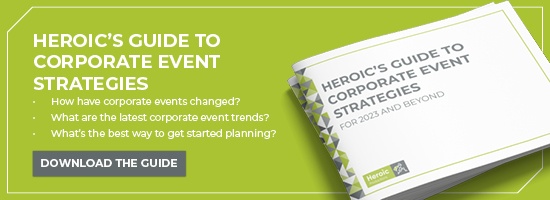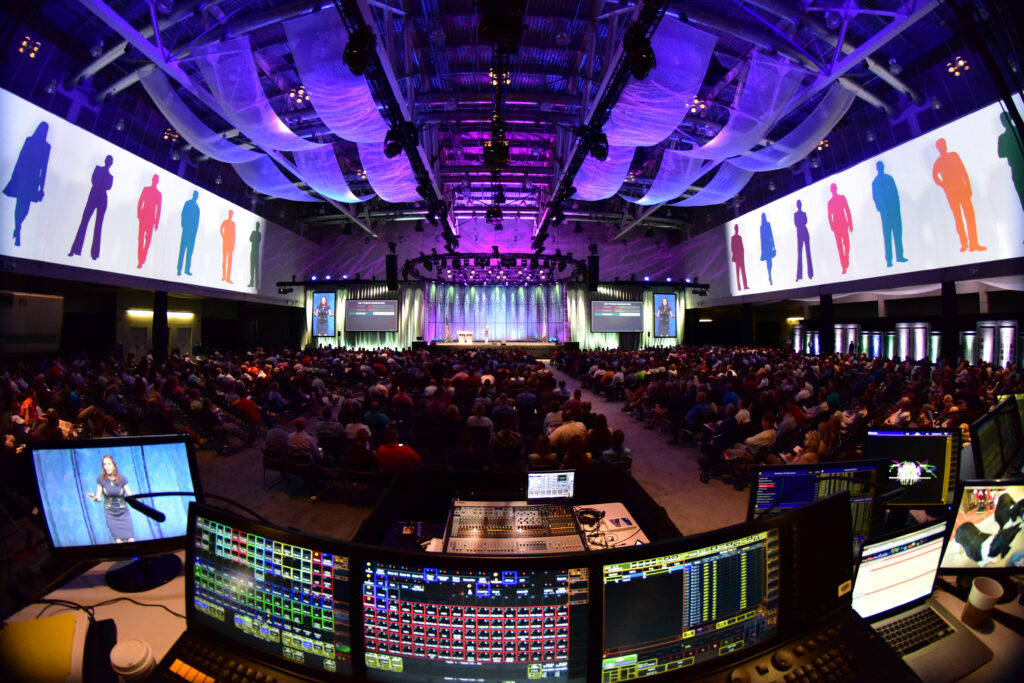July 10, 2022
Corporate Event Strategy: The Secret Behind A Successful Corporate Event—and How to Get It Right, Every Time
There’s a secret that the best corporate event planners know—and it has little to do with creative menus, spectacular venues, or swag bags chock full of trendy products. It’s this: strategy comes first—and the most successful corporate events get built around that.
If you follow that single principle, corporate event planning becomes an extension of your brand’s marketing and communications objectives, and everything else—theme, program, food, decor, entertainment, swag, or more—can fall into place. That’s because every decision and detail either furthers your central strategy—or it doesn’t.
For corporate event planners and their clients, the key question then becomes: how do you establish and execute a clear and achievable event strategy? Simple. Answer these three critical questions.

Question 1: Why are you gathering people? What’s the message or goal?
We’ve all been to the meeting that could have been an email, the lunch that could have been a call, and the call that should have been canceled. This principle intensifies with an in-person corporate event.
So why are you gathering this designated group at this particular time? Is it for a product launch or a new sales initiative? Maybe it’s to celebrate a corporate merger, make key leadership introductions, or rally the troops after a milestone year. Take a moment to consider what you want to achieve—and how that will be measured.
What’s the key message? What are the metrics of success—the data that will convey you’ve gotten the message across? This might be ROI, quantified by sales lift, stronger customer relationships, or some other measurable KPI. It might include attendee happiness, as demonstrated by a certain percentage of positive post-event evaluations (hint: consider the questions you’ll ask them before you start planning). What other data do you want to gather to track the success of your event? These will differ according to your greater purpose—but being clear on these metrics helps you know what you’re aiming for.
Time is valuable, and attendees will appreciate your thoughtful crystallization of why they’re being brought together for a few hours or days. And when whatever you’re hoping to communicate—the magic of a new product, the synergies of a merger, the vision of fresh leadership, a collective monumental achievement—gets soundly received in a way you can quantify, you will know your event has been a success.
Strategists figure out the “why” so planners can figure out the “how.” Now that you know what your event is intended to achieve, you can fill in the event details.
First, ask yourself what kind of event would serve your strategy best? Is it big and high-energy or smaller and more intimate; splashy or discrete; daytime, evening, or multi-day; fiery or icy; loud or soft; eccentric, trendy, or classic? Or somewhere in between?

Question 2: What’s its shape, structure, and flavor?
Next, put yourself in your attendees’ shoes at every stage of the planning process. Great corporate event planning results in attendees feeling seen, thought of, and cared for. You want attendees to feel a gamut of emotions: from motivated to empowered to connected, surprised to energized to delighted. Understanding the emotional journey and how it evolves will help you sustain engagement throughout.
Some do’s:
- Design branded and customized experiences. Think about the continuity of the message throughout the event and even how the food and beverage can tie into that message.
- Impact all five senses when possible.
- For example, use script writing and creative visual support to awaken sight and sound (and to prevent ‘death by PowerPoint.’)
- Use stellar food and beverages and even aromatherapy throughout to tantalize taste and smell—and to carry the continuity of a well-crafted message.
- Think about volume control and temperature. When will you make things cozier? When would you cool things down?
- Build on previous successes, or utilize learning moments drawn from past events.
At every step, go back to your objective and event strategy. Make sure that every decision you make supports and aligns with that strategy.
Question 3: How do you keep everyone safe?
Covid changed the rules—and the expectations.
Pandemic added new challenges to event logistics, and it raised the stakes, too. Anticipation is currently soaring. Most event attendees have been working remotely for two years, and they’re ready to celebrate. Maybe this is their first opportunity to meet—and bond with—new colleagues. Maybe they’re experiencing concerns about Covid, and you’ll need to assure them they’re safe.
Covid has also changed timeframes: lead times are much shorter now, with two or three months settling into more of a norm. For one thing, it’s challenging to plan when it’s unclear if there will be a Covid spike, a new variant, or a transportation barrier. For another, communication with venues has become challenging, due to staffing shortages.
The best event planners are prepared and adaptive, with an affinity for problem-solving. Now picture this: it’s been weeks, and people are still buzzing about your corporate event. The word is that everyone left the event feeling like it was time well spent—connections were made and the level of engagement hit just the right mark.
So the event was a success? Well, you tell us. You now know the secret.
At Heroic Productions, we are supportive, strategic collaborators. We know the right questions to ask, and how to guide you toward solutions that serve your company best. And we know how to create an event strategy—and complete it.





